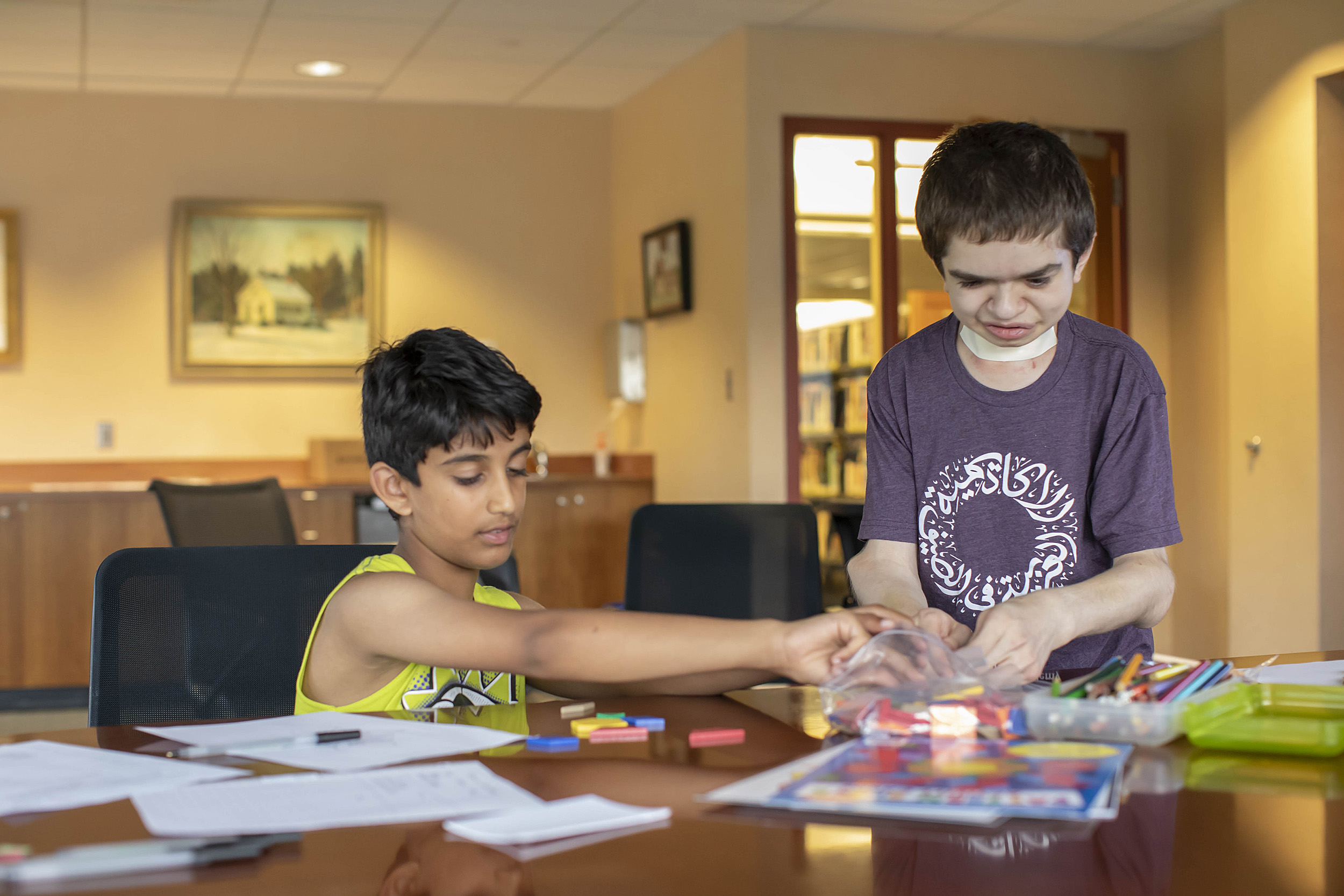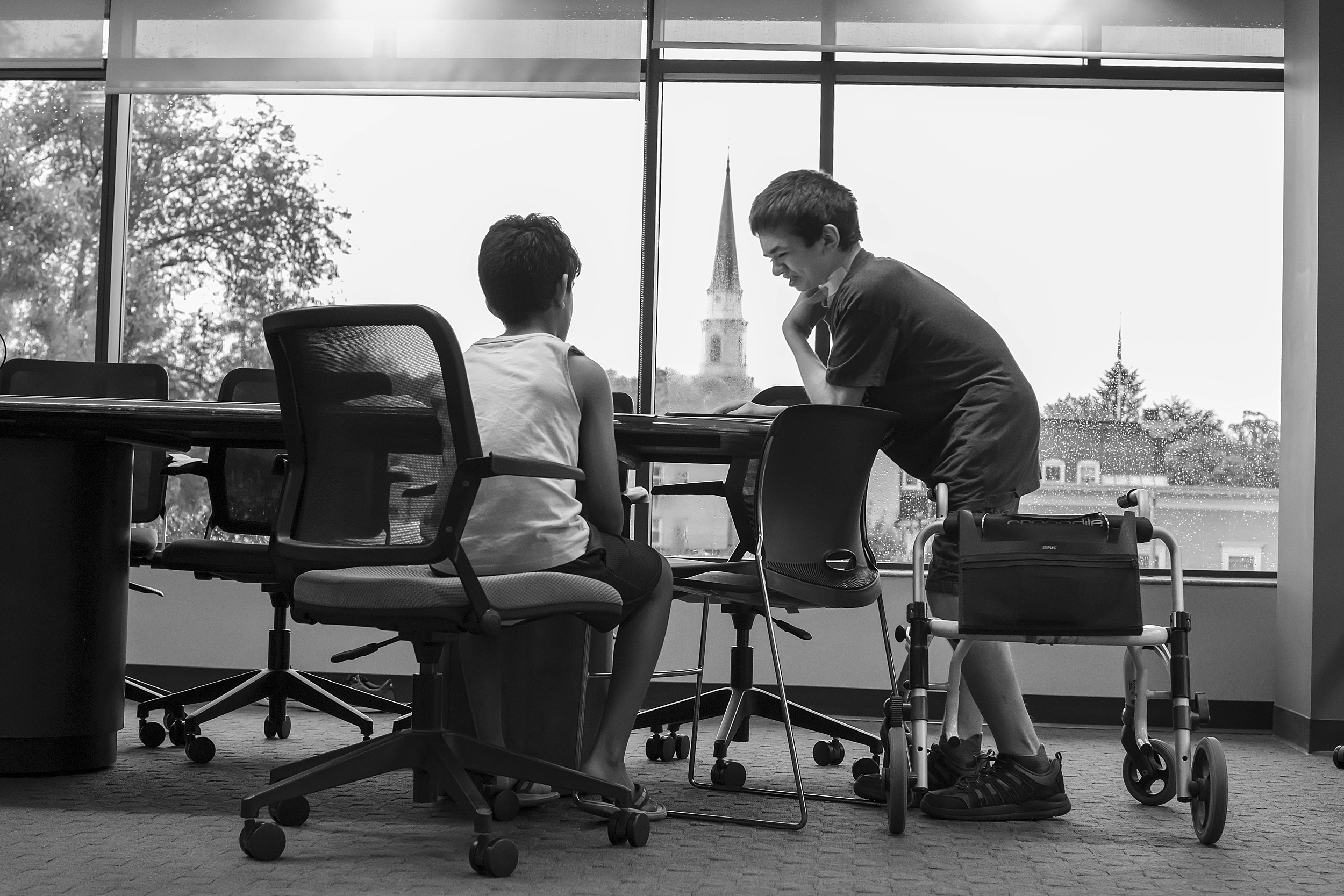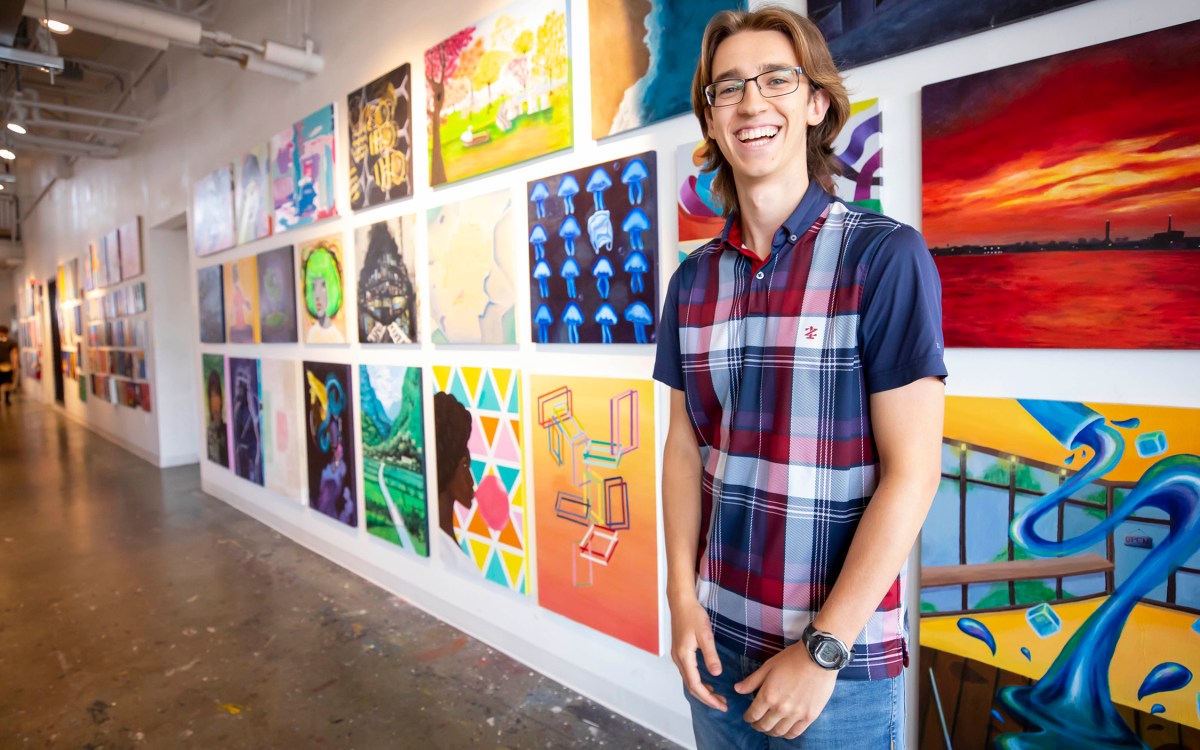
This summer, Ben Elwy ’23 (right) is teaching Arabic and cultural education to children at the Wellesley Free Library.
Photos by Rose Lincoln/Harvard Staff Photographer
Service in any language
First-year used summer program to teach Arabic language and culture to young students
More like this
Since his first Latin class in seventh grade, Ben Elwy ’23 has used language to learn about the world around him.
In addition to his native English and Latin, he knows ancient Greek, modern Arabic, and German, which he learned in school, through extracurricular programs, and at summer camps. He has collected 11 dictionaries, including volumes in Norwegian, Japanese, and Maori, through his own travels and those of his family and friends, who always know what to get him as a souvenir.
“I love seeing all the patterns in a language and what they mean,” he said. “For example, the English word ‘door’ is related to the Latin word ‘forum,’ the ancient Greek word ‘thur,’ the German word ‘tür,’ and the Hindi word ‘dvar,’ all of which have to do with doors or passages. Those languages are spread out across continents and time, but they’re connected in the origins of their words. I think that’s amazing.”
This summer, Elwy made use of his passion for language in his hometown of Wellesley through a project with Harvard’s Service Starts with Summer Program, a new initiative for a select number of incoming first-year students. As part of the College’s commitment to encouraging public service the entire class will participate Thursday in the annual Day of Service in which students will do volunteer work at locations around Greater Boston.
For his program venture, Elwy committed 80 volunteer hours to designing and teaching a program called Arabic and Cultural Education. The program ran for an hour every day for two weeks in late July and early August at the Wellesley Free Library, with the first week designed for third to fifth graders and the second for sixth to eighth graders.
“In general, I noticed, at least in my community, that there aren’t that many opportunities to learn Arabic, which is why I focused on that for my project,” said Elwy, adding that it was a language that seems particularly relevant right now and one that many are curious about. “My program is about language you could go and use right away if you were in an Arabic-speaking country.”
Each day focused on a theme, including a day at the market, a typical school day, or the geography of the Arab world. Elwy based the curriculum on his experiences during two summers in the Arabic Summer Academy in Charlestown. In that program and in Elwy’s, language and culture go hand in hand. Elwy’s family has roots in India, Egypt, Germany, and the U.S., and his multicultural upbringing contributed to his interest in making connections across cultures.
“Just learning how people introduce themselves in an Arabic-speaking country is an example of what that culture is like,” said Elwy, referring to how much residents appreciate attempts by visitors to learn even simple greetings in their language. “When I learn languages, it’s an opportunity to learn more about culture and how people live in other parts of the world.”
“When Ben approached me, I was happy to help him, because I knew that he was very organized, had good follow-through, and seemed very committed to what he was doing,” said Emma Weiler, the library’s Children’s Department supervisor who oversaw Elwy’s project. “The library is a special place for this kind of program, because we are a community gathering place that tries to be inclusive of everyone. I thought Ben’s idea of teaching Arabic and getting people to understand each other a little more would go a long way.”
Elwy had never taught before developing his program, but he was no stranger to the world of community service. In 2016, he began volunteering through The Congressional Award, a personal-growth program for American youth run by Congress, with four areas of focus, one of which is service.
Throughout high school, he volunteered at organizations across Greater Boston, including the Red Cross Food Pantry and Cradles to Crayons. In 2017, he and his older sister, Lucy, received the U.S. President’s Volunteer Service Award in recognition of their contributions.
Elwy works with student Omar Ahmed (left) in the library.

For Elwy, the biggest challenges, besides his lack of teaching experience, involved his insecurities about his ability to take on the administrative, educational, and community-outreach components of the program. Looking back, he is proud of his choice to step outside his comfort zone.
“Something that I like about service is the opportunity to help other people, specifically for me because I have a physical disability,” said Elwy, who has Schwartz-Jampel syndrome, a rare neuromuscular genetic condition that can affect bone development and muscle flexibility. “I also appreciate being able to see what I myself can do, and that’s something that service lets me experience and show others.”
Based on his experience this summer, Elwy is working with the Classical and Modern Languages Department at his alma mater, Wellesley High School, to create a program for student volunteers to develop and teach their own language and culture classes for elementary schoolers. As he steps onto campus for his first year at Harvard, Elwy is looking forward to bringing his skills and experience to a new and globally focused community.
“This program was an opportunity to figure out how I can use what I have to help people as much as possible,” said Elwy. “I hope to continue using my interests, as they develop, to do community outreach and help people understand each other.”
Participants in the Service Starts with Summer Program commit to contributing at least 100 hours to a service project in their hometowns over the summer, with 80 hours spent on direct service and 20 spent in professional-development settings including cohort meetings, webinars, and a day of service on campus. Most program participants work in unpaid positions and are eligible to receive a $1,500 stipend through the program.






